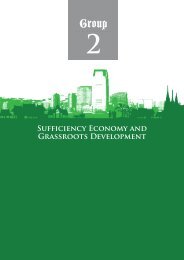Conflict, Legitimacy and Government Reform: Equitable Allocation of ...
Conflict, Legitimacy and Government Reform: Equitable Allocation of ...
Conflict, Legitimacy and Government Reform: Equitable Allocation of ...
Create successful ePaper yourself
Turn your PDF publications into a flip-book with our unique Google optimized e-Paper software.
90 KPI Congress XI<br />
Canadian International Development Agency (CIDA) IDG-Net is being<br />
spearheaded by the Institute On Governance, in partnership with the<br />
Institute <strong>of</strong> Governance Studies (IGS) in Bangladesh <strong>and</strong> the Centre for<br />
Good Governance (CGG) in India. IDG-Net is put forward as one<br />
model through which good governance, <strong>and</strong> equitable allocation <strong>of</strong><br />
resources, could be enhanced.<br />
Defining <strong>and</strong> Assessing <strong>Equitable</strong><br />
<strong>Allocation</strong> <strong>of</strong> Resources<br />
In defining ‘equitable allocation <strong>of</strong> resources’ it is helpful to review<br />
the definition <strong>of</strong> equity from the 2006 World Development Report:<br />
Equity means that the resources which are being distributed to the<br />
people are distributed in a way that results in individuals having equal<br />
opportunities to pursue a life <strong>of</strong> their choosing <strong>and</strong> be spared from<br />
extreme deprivation in outcomes. 1<br />
In practical terms, when we talk <strong>of</strong> ‘equitable allocation <strong>of</strong> resources’<br />
we refer to a situation where everyone has equal opportunities to pursue<br />
goals like economic prosperity, educational achievement, <strong>and</strong> political<br />
representation. <strong>Equitable</strong> allocation <strong>of</strong> resources also means equitable<br />
access to services <strong>of</strong> the state, including infrastructure, health services <strong>and</strong><br />
other public supports. Opportunity would be granted regardless <strong>of</strong> place<br />
<strong>of</strong> birth, race, gender, class or social st<strong>and</strong>ing. In a Thail<strong>and</strong> in which<br />
resources were allocated equitably there would be virtually no difference<br />
in the opportunity afforded to a girl born to farmers in a hill tribe north<br />
<strong>of</strong> Chaing Mai, than to a boy born in Bangkok to a family <strong>of</strong> large l<strong>and</strong><br />
<strong>and</strong> property owners with strong connections to the power holders.<br />
In reality, income inequalities both within <strong>and</strong> across countries are<br />
severe <strong>and</strong> they are growing. In much <strong>of</strong> the world opportunities for<br />
1 This definition is based on a definition <strong>of</strong> equity used in the “Overview”, World<br />
Development Report 2006 P. 2














